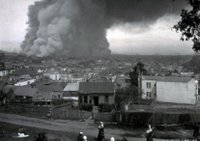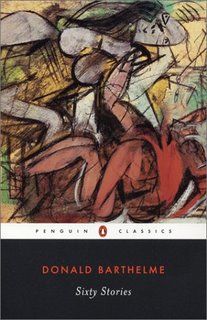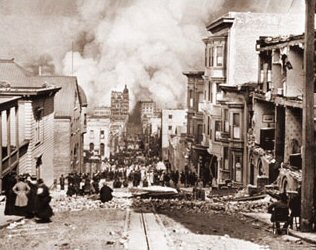 Just when you thought the Food Network had sold its soul to the reality television devil (I'm talking to you, "The Next Food Network Star"), along comes the first bit of watchable original programming in quite awhile: "Healthy Appetite with Ellie Krieger".
Just when you thought the Food Network had sold its soul to the reality television devil (I'm talking to you, "The Next Food Network Star"), along comes the first bit of watchable original programming in quite awhile: "Healthy Appetite with Ellie Krieger".
Ellie who? Well, the Food Network has certainly saturated their commerical air time with her.... she's young, she's sexy (threatening to perhaps dethrone Giada "Food Babe" DeLaurentiis?), and she loves chocolate.... and entreats you to call the food police as she unwraps the foil of her chocolate bar.
The pitch? Looks like she's found the holy grail of cooking healthy.... yeah, yeah, she's a nutritionist, but she knows how to cook things that are good for you without removing the tasty stuff that is usually not so good for you. She's not cutting corners, and she tells us so: Hence, we have episodes where she's making triple chocolate cookies (without the usually nasty "good for you" fillers in chocolate baked goods like bananas) and scrambled eggs with avocado and buffalo chicken fingers with blue cheese dressing. She uses butter and mayonnaise. Bottom line: I salivate.
She's got a sexy coolness that is a refreshing reprieve from the high-on-diet-pills energy of Rachael Ray or the hedonistic butter psychosis of Paula Deen. She talks lovingly about her husband and daughter, sometimes parading the husband onscreen as she fills him with tasty meals. Her show is easy-going, thanks in part to her calm-yet-bubbly voice, and is instructional, thanks to the little tidbits we learn about correct portion sizes and the composition of vitamins in the food we eat. Bookending commerical breaks are atmospheric shots of her walking around New York City, for instance the Starbucks right at the gateway of St. Marks in the East Village, and I imagine myself running into her and following her home where she will make me delicious food. Maybe I'd just say hi instead. Or take covert pictures with my cell phone camera.
Saturday, April 29, 2006
more reasons for a Healthy Appetite
pondered by
is that so wrong?
at
2:10 PM
4
comments
![]()
Tuesday, April 25, 2006
imagining what I would say if I didn't get the job I wanted
Well, if there were ever an example of what blogs are made for.... it would be in response to something like this:
I just found out who Mark Slouka was yesterday, when I read a little article of his that tries to open a new asshole on the Columbia University writing MFA program. Talk about biting the hand that fed you.
Now, whatever points he brings up that do have merit are lessened dramatically by the fact that he didn't get appointed for tenure at Columbia.... and then decided to sling this kind shit at them. By publishing in the Columbia campus newspaper, no less? Maybe more reputable and high-profile outlets (Harper's, New Yorker, the Atlantic) rejected his catharsis, or maybe he found just the right niche audience to witness his wrath. Who reads the Columbia Spectator than just Columbia students, anyway? He all but spells out the names of the faculty and administration he targets, and he published his angry diary scribblings in a place that these targets all have easy access to.
I'm not so sure that this was perhaps the most professional way to go about expressing his dislike of not getting the job he wanted. He does pinpoint some issues that I think are worth really taking a look at (in part because it seems that maybe no one is talking about them?), but he immediately paper-shreds his integrity by the fact Columbia didn't give him the job. He goes on then to attack former colleagues he believes are not as well-qualified as he is. Is that such a good idea? He's sitting pretty with a tenure-track position elsewhere now, so the comfort of giving the finger to Columbia doesn't come with potential-job backfire. Or does it? How would his current university-of-hire feel if he turned his vitriol on them? Who's gonna pick up this guy's book and be so happy to read him? Probably nobody who graduates(ed) from Columbia. If situations were reversed and Columbia hadn't have burned him, his article would have had more of a lasting impact and probably wouldn't be dismissed as angry rantings. After all, why apply for tenure at a university MFA program where you feel the quality is so crappy? This lessens that impact all the more.
Rick Moody wrote a similar article in Harper's last summer that momentarily set its crosshairs on Columbia's writing MFA program.... but he was referring to the Columbia of the 1980s. I don't have a good idea on how it has changed for the better or worse, but the fact that he threw a hammer at Columbia doesn't look good for it no matter what decade you're writing about. Ultimately, Rick Moody didn't pick up any screaming fans from Columbia after his article, which in my opinion whined a bit too much about how nobody seemed to like him. Harper's ain't a counselors couch, buddy.
But, maybe Slouka's tirade won't be dismissed so soon? Two nails in Columbia's writing MFA coffin so far, and that can't be ignored. Scary to see what happens next....
A friend of mine told me about an essay/interview of Flannery O'Connor's and her response to the burgeoning popularity of writing MFA programs. When prompted about whether or not MFA programs stifle writers, O'Connor responds that she thinks that they don't stifle writers enough, and that thanks to the MFA there's been a nasty showerdrain-clog of bad writing and bad writers out there. Couldn't Slouka have said something like this instead? Flannery O'Connor wasn't pissed that she didn't get a job, though.
pondered by
is that so wrong?
at
6:00 PM
3
comments
![]()
Tuesday, April 18, 2006
the great quake of 1906
On this day one hundred years ago, San Francisco was almost completely destroyed by a massive earthquake. This earthquake was no little shaker; at a magnitude 7.9 (the most recent estimate.... I'm not even sure if they use the Richter scale anymore), the epicenter sat two miles into the ocean off Ocean Beach near Lake Merced.  Brick buildings crumbled everywhere (and hence we learned our mistake: not so many brick buildings in California anymore), and landfill-covered chunks of land that used to be part of the bay upchucked and swallowed foundations whole. It wasn't just the earthquake, though: a massive fire came through and destroyed everything that we think of as downtown.... the entire northeastern quadrant of the city burned to the ground.
Brick buildings crumbled everywhere (and hence we learned our mistake: not so many brick buildings in California anymore), and landfill-covered chunks of land that used to be part of the bay upchucked and swallowed foundations whole. It wasn't just the earthquake, though: a massive fire came through and destroyed everything that we think of as downtown.... the entire northeastern quadrant of the city burned to the ground. Having experienced a 6.9 earthquake ten miles from its epicenter in 1989 (which, no matter how much they downplay it lately, was a huge m-f-ing earthquake, in its path wiping out all of downtown Santa Cruz for instance), I can tell you that a 7.9 back when buildings were unstable was probably quite an event.... unlike anything seen since then (unless you were in Anchorage in March of 1964; their 9.2 earthquake is the second largest recorded in modern history). In 1989, my house lost a chimney, a big brick hearth, and a window or two. The land splits apart (in some places) and wobbles, and you can hear the corners of the building you're in crack and whine. Aftershocks are pretty intense too. Pretty trippy. I'm in the camp that finds earthquakes more exhilerating than terrifying, but I don't wish any of the destruction or death that comes with them.
Having experienced a 6.9 earthquake ten miles from its epicenter in 1989 (which, no matter how much they downplay it lately, was a huge m-f-ing earthquake, in its path wiping out all of downtown Santa Cruz for instance), I can tell you that a 7.9 back when buildings were unstable was probably quite an event.... unlike anything seen since then (unless you were in Anchorage in March of 1964; their 9.2 earthquake is the second largest recorded in modern history). In 1989, my house lost a chimney, a big brick hearth, and a window or two. The land splits apart (in some places) and wobbles, and you can hear the corners of the building you're in crack and whine. Aftershocks are pretty intense too. Pretty trippy. I'm in the camp that finds earthquakes more exhilerating than terrifying, but I don't wish any of the destruction or death that comes with them.
The 1906 Earthquake is quite a big deal to San Franciscans, because it still weighs heavily on their minds. It's interesting: in New York City, older buildings are heralded as being "pre-war"; in San Francisco, the older buildings (and usually the most beautiful) are "pre-earthquake". Of course in New York, the buildings weren't destroyed by a war.
I always assumed that I'd be in San Francisco for the centennial celebration of the 1906 quake. For past years they haul out the few really old grannies who were one or two years old during the quake, and have them ring a bell or something at 5:12 am to commemorate the event. Apparently there's a big party in the city today to celebrate the centennial, and it's a bummer that I'm not there to join in, being such a lover of all things San Francisco.... now, having taken a 90° turn, I've ended up on the other side of the country where earhthquakes sound scarier to people than hurricanes or tornadoes.
On a related note, I've been meaning to read 1906 since it came out two years ago, just for the hell of it. It has the potential to be trashy, but it's nice to see San Francisco treated right in the realm of fictional storytelling, other than in some crappy tv shows that shall remain unnamed. They have yet to make a stand-out movie about the 1906 earthquake (correct me if I'm wrong).... it could make an awesome Titanic-style epic...! Are you listening, producers? I'll write it for you.
pondered by
is that so wrong?
at
12:20 PM
1 comments
![]()
Tuesday, April 11, 2006
workshop burnout
I've been taking writing workshops now for almost five years. I'm thinking there's definitely a saturation point where the random feedback coming in starts to tarnish the intentions of the work of writing going out. It doesn't help any that my current workshop tends to be debilitatingly negative (thanks in part to the workshop leader, who manages to turn compliments into negative comments). When I write, I have always imagined the voices of my potential readers giving me feedback.... usually it keeps me in check, but lately it seems to be stopping production. When you have a workshop that's so difficult to please, how can you turn out anything worthwhile to read? It's come to the point where nothing can please them, no matter how hard you try.
All this said, I'm not stupid enough to go into a workshop with the intention of pleasing their interests. I don't write for my workshop, I write for myself in hopes that the workshop can give me beneficial and constructive feedback to improve. This current workshop is just a bad apple.... but in the end, they're not all that bad. I like the people just fine, but somehow the energy was set at the wrong level early on and I don't think we make for the best class. Every workshop is different, and chemistry between the members matters a lot. My attitude about it all now comes from a combination of resoundedly negative feedback (on everybody's work, not just mine) and the fact that I've just been in workshops for too long. I can get past the workshop-feedback-editor-in-my-mind for my own writing.... but somehow, those editors are arguing with themselves when I'm reading published fiction.... and good published fiction at that. Case in point: I recently picked up a collection of Donald Barthelme's short stories (Sixty Stories, after which I look forward to reading Forty Stories). They're weird and strange and intricate and experimental and beautiful. An example of some of his stories (and some of my favorites): "The Zombies" about the community of good zombies and bad zombies; "I Bought a Little City" about buying the city of Galveston, TX and shaping it into the shape of the Mona Lisa visible from the air; "The Great Hug" about a man with symbolic balloons and the one woman who can pop them. I'm not a fan of all of the stories, though.... some seem needlessly experimental and too despondent for my liking.... but there are a handful that are masterworks of fiction, and perfect examples that prove to me that one can never run out of things to do with fiction, even when sometimes it seems like it's all been done before. My favorite so far: "The Balloon", haunting and gorgeous; a story about a guy that inflates a giant balloon over New York City, covering some eighty square blocks. The narrator talks about how people in the city take day trips walking over the balloon, or meet on the street at certain places where it dips to the ground or touches against the buildings. People attach paper lanterns on the underside and have block parties. The end is a revelation, so bittersweet and touching.... why did the guy inflate the balloon? Because his lover left him, and it was nothing more than a symbol.
I can get past the workshop-feedback-editor-in-my-mind for my own writing.... but somehow, those editors are arguing with themselves when I'm reading published fiction.... and good published fiction at that. Case in point: I recently picked up a collection of Donald Barthelme's short stories (Sixty Stories, after which I look forward to reading Forty Stories). They're weird and strange and intricate and experimental and beautiful. An example of some of his stories (and some of my favorites): "The Zombies" about the community of good zombies and bad zombies; "I Bought a Little City" about buying the city of Galveston, TX and shaping it into the shape of the Mona Lisa visible from the air; "The Great Hug" about a man with symbolic balloons and the one woman who can pop them. I'm not a fan of all of the stories, though.... some seem needlessly experimental and too despondent for my liking.... but there are a handful that are masterworks of fiction, and perfect examples that prove to me that one can never run out of things to do with fiction, even when sometimes it seems like it's all been done before. My favorite so far: "The Balloon", haunting and gorgeous; a story about a guy that inflates a giant balloon over New York City, covering some eighty square blocks. The narrator talks about how people in the city take day trips walking over the balloon, or meet on the street at certain places where it dips to the ground or touches against the buildings. People attach paper lanterns on the underside and have block parties. The end is a revelation, so bittersweet and touching.... why did the guy inflate the balloon? Because his lover left him, and it was nothing more than a symbol.
So, the point I'm getting at: if Barthelme's stories were taken into a workshop, they'd be ripped into confetti. There's no way that stories like this wouldn't be eviscertaed on the spot in a snarling workshop. His style is sometimes slapdash and fragmented. His narrators wander and sometimes misdirect. Even I come across some things that I think could have been written more clearly or differently, but in the end his stories are viewed as successes and loved by many. So, if stories like his won't pass the muster of workshop, what makes good fiction then? Is that even the point of the workshop? The goal is not to be validated by your peers, but certainly that helps.... and I think sometimes the want to be recognized rather than assisted eclipses the whole purpose.
So, when I'm reading fiction, I no longer have a grasp on what's good or bad. Everybody has different taste.... so when in workshop they pontificate their tastes onto your work and therefore provide negative feedback....? What are you left with? Does your taste even matter? What about when someone turns something into workshop that (to me) is so clearly poorly written and scattered, yet they get a gentle read from the class? People gush and glow, and I'm left wondering "WTF?" Meanwhile the work that I find very strong gets ripped apart with jagged teeth. Maybe this should be of consolation for my own writing, but somehow it isn't.
So.... the story I'm writing next is weird. Inspired in part by Barthelme.... but I know it's going on the chopping block. For some reason I've been writing weirder stuff as of late, straying from the traditional realism I used to write in all the time. I'm looking forward, in a way, to the summer.... to clear my mind of workshop so that next year I can jump right back in with a refreshed attitude. Don't get me wrong: I like workshops and am looking forward to next year's, but I need the break. In the mean time, I'm gonna keep reading published fiction, and try to rid those workshop voices out of my head for that, too.
pondered by
is that so wrong?
at
12:03 PM
4
comments
![]()
Monday, April 10, 2006
24: predictability will be the death (at least creative death) of you
Further proof that the writers of "24" are suffering from delusions of grandeur:
But I think you could make the argument that the outcry over Tony's death, over Edgar's death, over Palmer's death, in a way, means we did the right thing. The purpose of the show is to appeal to and produce emotion in the audience, and clearly we have.
As far as their (i.e. executive producer Evan Katz's) treatment of the reliable bloodbath of established characters, he spits the same useless easy-way-out shit and calls it sugar:
....we really felt last year we had gone as far with David Palmer as the character could go.
and this, too:
In terms of Tony, we knew that was coming. That was a long time coming. We felt we had told the stories we could for his character.
Uh, guys.... let me say *again* that just because a character has "run its course" in your eyes does not mean that you should go and kill them off. Why not write them out in a unique and open-ended way and actually challenge yourselves to do something interesting with the character? Something that doesn't involve a bodybag for a change. I've said it before, but here you get it again: if a "24" movie is in the works, wouldn't it be nice for the characters we haven't seen in awhile turn up for a big hurrah? That would be certainly surprising and satisfying. Too bad they're all dead.
President Palmer's reaction is similar to mine. I'm glad I'm not the only one. However, his attitude might be tainted because he got a pink slip and I didn't.
That’s the result of destroying these relationships [between Jack and the other killed-off characters]. You have to constantly stunt to get people to watch, because every relationship that Jack has had, from Season 1, all those people are gone. It puts this man against the world thing in, and it becomes a bit cartoonish, not plausible.
 All this said, I'm not so sure why there was such an outcry about Edgar's death to begin with. He was a missed opportunity last season (he should have gone bonkers), I think the writers realized that, and they didn't have anything interesting for him to do this season except die. More proof of what the writers like to do when they think the character has told all the stories they possibly can. Dear producers: you're getting predictable.
All this said, I'm not so sure why there was such an outcry about Edgar's death to begin with. He was a missed opportunity last season (he should have gone bonkers), I think the writers realized that, and they didn't have anything interesting for him to do this season except die. More proof of what the writers like to do when they think the character has told all the stories they possibly can. Dear producers: you're getting predictable.Yeah yeah yeah, I'll be tuning in tonight.
pondered by
is that so wrong?
at
3:10 PM
0
comments
![]()
Thursday, April 06, 2006
from dirty libby to delicious libby
 She's spent too much time in the background as second-season-addition Libby, the clincial psychologist (or is she?), on "Lost".... but on yesterday's episode, though, we finally got our treat. And, a pretty awesome reveal at the end (to your left) regarding her character.... turns out she happened to be in the loony bin with Hurley at the same time, but they don't seem to remember each other (....or at least Hurley doesn't). This is a step up from the usual pretending-to-be-tricky character connection crap the the writers have too much fun with. I have to admit, I'm afraid "Lost" might turn out to be a grand exercise where we find out at the end that the writers were flying by the seat of their pants the whole time. They've gone out of their way to seed so many little details (hardcore viewers are calling them the DVD-friendly term "Easter eggs") in their episodes, and I'm starting to worry if they're ever going to connect the dots. I'm actually interested to see how this one with Libby and Hurley plays out.... assuming it does. This twist was provoking and satisfying.... a trait as of late where narrative shock value in TV tends to miss the bar.
She's spent too much time in the background as second-season-addition Libby, the clincial psychologist (or is she?), on "Lost".... but on yesterday's episode, though, we finally got our treat. And, a pretty awesome reveal at the end (to your left) regarding her character.... turns out she happened to be in the loony bin with Hurley at the same time, but they don't seem to remember each other (....or at least Hurley doesn't). This is a step up from the usual pretending-to-be-tricky character connection crap the the writers have too much fun with. I have to admit, I'm afraid "Lost" might turn out to be a grand exercise where we find out at the end that the writers were flying by the seat of their pants the whole time. They've gone out of their way to seed so many little details (hardcore viewers are calling them the DVD-friendly term "Easter eggs") in their episodes, and I'm starting to worry if they're ever going to connect the dots. I'm actually interested to see how this one with Libby and Hurley plays out.... assuming it does. This twist was provoking and satisfying.... a trait as of late where narrative shock value in TV tends to miss the bar.When I have my own TV show, I want her on it. Just added to the ever-growing dream cast list.
Is it bad to imagine the actors who you want to play the roles you write?
pondered by
is that so wrong?
at
9:56 PM
1 comments
![]()


